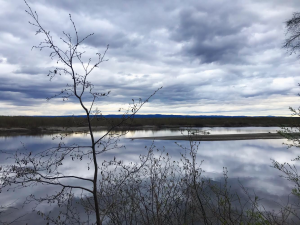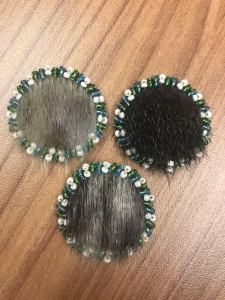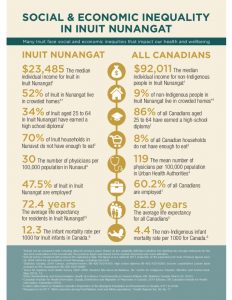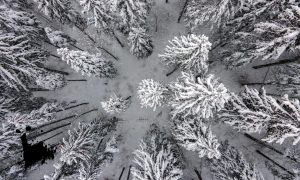When Nunatsiavut Inuk researcher Jessica Penney was deciding where to conduct her field work for her Masters, she didn’t have to look far, she simply had to turn to her family.
Though raised in Iqaluit, Penney’s family live in Newfoundland and Labrador and are directly impacted by the Muskrat Falls project.
“For me it was going back to the community. I didn’t grow up in Labrador and I wanted to know how Muskrat Falls was affecting them,” said the student.
Penney is currently completing her Masters of Science in Global Health at the University of Glasgow and conducted research on the ground in Happy Valley-Goose Bay this summer past.

Penney focused on how the project impacts the health and well-being of the Labrador Land Protectors who have been resisting the project.
“Prominent levels of methylmercury is common in reservoirs of hydroelectric projects and ingestion can lead to neurotoxicity,” explained the researcher. “There is also the risk of flooding and the North Spur might be unstable and that was a worry.”
The flooding of Muskrat Falls could lead to significant methylmercury levels making the food sources from the reservoir unhealthy to ingest.
While on the other side of it, Dr. Stig Bernander is an experienced civil engineer who has examined landslides and has warned that The North Spur of Muskrat Falls is unsafe and could result in a loss of life if it fails.
The physical risks to those surrounding the project are evident, but Penney also explored different aspects of health and how the project can bare a weight on the community in a variety of other ways.
“There was the fear that homes could be damaged and lives could be lost, “ said the student. “People were also scared of losing a lifestyle. Being unable access the river and land as much as they wanted. Those concerns affect mental health and wellbeing.”
Penney’s research involved interviews, surveys and sharing circles with land protectors, following the Indigenous Research Method.
“It is not a widely used methodology for academics, it’s rooted in accountability and building relationships,” she said of her approach. “Everyone had their own personal reasons for concern. Their families, their children and everyone drew on the importance of land and lifestyle in Labrador. They get food from the land, especially fish and have a relationship with the land.”

Seal broaches Penney made and gifted to every person who took part in the project
The group of Land Protectors Penney studied were concerned about their homes and lives, and mainly expressed a deep concern for the loss of their livelihood. The fears from the project are added to a lot of pre-existing conditions within the communities.
Inuit living in Inuit communities struggle from food insecurity with 70 % of households being insecure, compared to the rest of Canada with only 8 % of homes suffering from food insecurity.
On another significant note, the life expectancy within Inuit regions is 72, versus 84 in the rest of the country.

There are a lot of health impacts on the people of Labrador that can be increased with the negativity of the project.
In order to assess these impacts, Penney suggests the government take into account the voiced issues she heard throughout her research.
“The government needs to listen to Labradorians and take them seriously and take this into future decisions,” said the researcher.
“Labradorians are not necessarily taken into account and that affects their health. Being ignored and not consulted on things that are important to you impacts mental health. People felt stressed and felt they haven’t been treated fairly.”
For more information, you can read about Penney’s field work here.












Leave A Reply